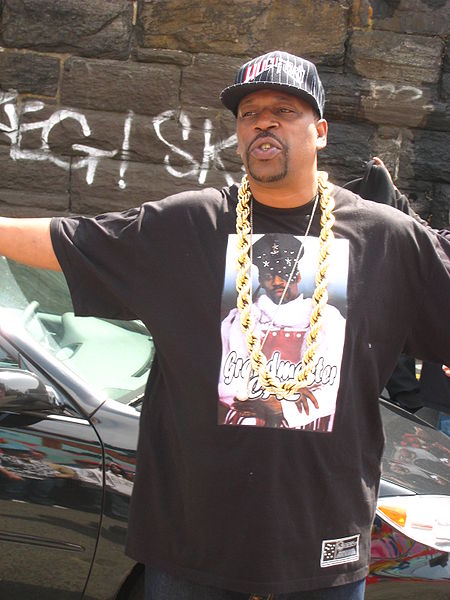
Caz pours a can of ginger ale into a glass cup and watches as the bubbles fizzle and rise to the top. He sets the empty can down next to his plate which is filled with the staples—mashed potatoes and green beans. A diamond-studded microphone connected to a thick silver chain hangs from his neck and his black leather jacket is slung over the back of his chair.
At first, his face is blank as he talks casually about hip-hop, the South Bronx and Eminem. He forks at his food, checks his phone and nods his head, soaking in the table conversations but not saying much.
But when the conversation shifts to his wife, who is sitting across the table, he can’t help but smile. They’ve been married for 16 years, have 18 grandchildren and live together in the Bronx, he explains.
She holds up a picture on her iPhone of one of their granddaughters to show everyone at the table and Caz lights up. His eyes are locked on the photo until he shifts from the bright phone screen to his wife. His face softens as he looks at her.
“She’s my best friend,” he says.
Grandmaster Caz is a legend. He is a lyrical genius, one of the founders of old school rap and the king of the South Bronx.
Caz, as his friends call him, spoke to St. John’s University students on Monday, Oct. 28 during common hour in the Starbucks café. While at lunch preceding his talk on campus he was quiet and reserved, when he spoke in front of the crowd of both hip-hop fans and admirers, he commanded the room.
Caz grew up in the South Bronx during the birth of hip hop. He said it was at one of the notorious DJ Kool Herc block parties in 1974 when he was just 13-years-old that he first had the calling to become a DJ.
“Kool Herc had a party indoor at a club one night and all the little kids from the neighborhood, the shorties, my age, would go outside the club and watch all the older kids go in,” he said. “But one particular night, one of the doormen blinked and I slid up there into club and I watched what the music did to people…but when I saw them play the music, I was like that’s what I want to do.”
After that party, Caz said he began launching his career. He bought equipment, started perfecting his craft and quickly evolved as an artist. He started his own group and adapted the stage name DJ Casanova Fly. Caz teamed up with his best friend from high school, DJ Disco Wiz, who was one of the first Latino hip-hop DJs.
“We started out just doing block parties, house parties and playing wherever we could play to try to make a name for ourselves,” he said.
And eventually they did. Caz became well known in the hip-hop business and for becoming the first-ever simultaneous DJ and MC. He wrote, he rapped and he battled other rappers including notorious hip-hop artists like Afrika Bambata. Caz was a member of the group The Notorious Two and then later, the Cold Crush Brothers.
But what Caz is well-known for is having his lyrics stolen by the Sugar Hill Gang in one of the most popular songs of the late 70s, “Rapper’s Delight.”
Caz explained the controversy to the group of curious St. John’s students with both humor and charm.
“The Sugar Hill Gang had little to do with it. Big Man Hank used to be down with me. Back in 1977-78 I wanted someone to help manage my group,” Caz said. “Big Man Hank had a club in the Bronx…we became cool after awhile and I asked Hank… ‘I need you to help manage our group’.”
Hank agreed. Caz said the first thing he did was take a loan out from his parents for $2,000. The money was used to fortify their sound systems and buy bigger equipment.
“In order to pay back this loan, Hank had to get a job,” Caz said. “Because we weren’t making money from hip hop yet.”
Hank got a job at a pizza shop in New Jersey, according to Caz. One day, a woman came into the pizza shop and saw Hank lip-syncing to a little boom box he had inside the store. The woman just happened to be auditioning people with her sons for a group they were putting together.
“Now Hank couldn’t wrap a package,” Caz said. “Hank couldn’t write a rhyme if his life depended on it.”
But Hank never told this woman he couldn’t rap or that he managed one of the best MCs in the Bronx. Instead Hank secured a record deal—for himself.
“Now imagine my shock and surprise when my manager came to me and told me he got a record deal,” Caz said.
So Hank asked Caz to write him some rhymes, but Caz thought there was not much to it. Caz gave him a book of rhymes and told him exactly what to say once he was in the studio.
“He ran with that,” Caz said.
Knowing Hank and his rapping abilities, Caz did not take any of it seriously at the time. When the record came out “Rapper’s Delight” was everywhere. Everyone started coming up to Caz saying they heard his record, but Caz hadn’t made a record. Hank had.
“Rapper’s Delight” became one of the defining songs of the hip-hop movement. It was on many billboards, playing out of every car stereo and thumping from every sound system.
“The problem was, the music was stolen,” Caz said.
And the song wasn’t just stolen from Caz; the bass line was also stolen from another song. Sugar Hill records was sued and the music and publishing rights were all taken from them.
“I never received a dime for ‘Rapper’s Delight’ even though I wrote a third of it,” Caz said. “And I was not even
credited as a writer on the song.”
Despite the controversy, Caz still writes, but mostly as a ghostwriter. He now chooses to write without credit, but for pay for his lyrics. Caz still performs and will speak at various universities and venues taking his stories and lessons along with him.
“Today ‘Rapper’s Delight’ still haunts me,” he said.
Caz made his own name for himself in the hip-hop business and is still considered one of the founders of the movement. Artists like Eminem have said Caz influenced and inspired them. And Caz has also worked with artists like LL Cool J and Ice T.
Caz continues to keep his eye on up-and-coming talent and is still very in tune with the business.
Senior Gabrielle Fuentes came to watch Caz and was pleasantly surprised at how much she enjoyed listening to him.
“He is a really funny and laid back guy,” she said. “I would have to say that I learned a lot about him.”
Caz finished his talk at St. John’s by performing his song “MC Delight” a response to the “Rapper’s Delight” controversy.
“My favorite part was when he was rapping at the end,” Fuentes said.
Standing at the front of the Starbucks café, Caz spit his lyrics with passion and ferocity as if they were written yesterday.
“I have been a part of hip-hop since its inception,” he said.













